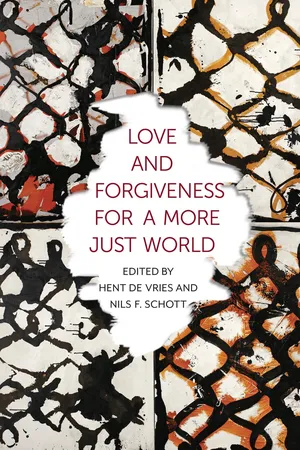
Love and Forgiveness for a More Just World
- English
- ePUB (mobile friendly)
- Available on iOS & Android
Love and Forgiveness for a More Just World
About this book
One can love and not forgive or out of love decide not to forgive. Or one can forgive but not love, or choose to forgive but not love the ones forgiven. Love and forgiveness follow parallel and largely independent paths, a truth we fail to acknowledge when we pressure others to both love and forgive. Individuals in conflict, sparring social and ethnic groups, warring religious communities, and insecure nations often do not need to pursue love and forgiveness to achieve peace of mind and heart. They need to remain attentive to the needs of others, an alertness that prompts either love or forgiveness to respond.
By reorienting our perception of these enduring phenomena, the contributors to this volume inspire new applications for love and forgiveness in an increasingly globalized and no longer quite secular world. With contributions by the renowned French philosophers Jacques Derrida and Jean-Luc Marion, the poet Haleh Liza Gafori, and scholars of religion (Leora Batnitzky, Nils F. Schott, Hent de Vries), psychoanalysis (Albert Mason, Orna Ophir), Islamic and political philosophy (Sari Nusseibeh), and the Bible and literature (Regina Schwartz), this anthology reconstructs the historical and conceptual lineage of love and forgiveness and their fraught relationship over time. By examining how we have used—and misused—these concepts, the authors advance a better understanding of their ability to unite different individuals and emerging groups around a shared engagement for freedom and equality, peace and solidarity.
Frequently asked questions
- Essential is ideal for learners and professionals who enjoy exploring a wide range of subjects. Access the Essential Library with 800,000+ trusted titles and best-sellers across business, personal growth, and the humanities. Includes unlimited reading time and Standard Read Aloud voice.
- Complete: Perfect for advanced learners and researchers needing full, unrestricted access. Unlock 1.4M+ books across hundreds of subjects, including academic and specialized titles. The Complete Plan also includes advanced features like Premium Read Aloud and Research Assistant.
Please note we cannot support devices running on iOS 13 and Android 7 or earlier. Learn more about using the app.
Information
Table of contents
- Cover
- Title Page
- Copyright
- Contents
- Preface and Acknowledgments
- Human Alert: Concepts and Practices of Love and Forgiveness
- 1. Orange Alert
- 2. What Love Knows
- 3. Unpower: An Interview with Hugues Choplin
- 4. Revenge, Forgiveness, and Love
- 5. Love and Law: Some Thoughts on Judaism and Calvinism
- 6. “A Mother to all”: Love and the Institution of Community in Augustine
- 7. Looking Evil in the Eye/I: The Interminable Work of Forgiveness
- 8. Beyond Right and Wrong: An Exploration of Justice and Forgiveness
- 9. Remarks on Love
- 10. To Forgive: The Unforgivable and the Imprescriptible
- 11. Thoughts on Love
- 12. The Passionate Utterance of Love
- Suggested Reading
- Contributors
- Index
- Series Page